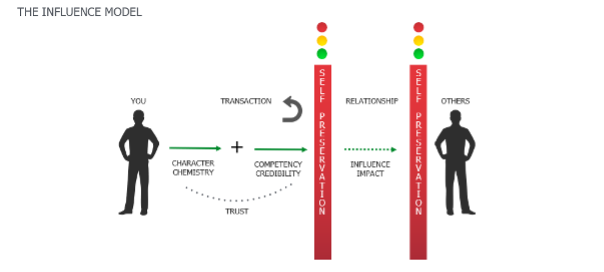Connect with Us
602 Park Point Drive, Suite 225, Golden, CO 80401 – +1 303.495.2073
© 2025 Medical Affairs Professional Society (MAPS). All Rights Reserved Worldwide.
Our ability to build trust and grow influence that extends beyond the transactional is at the heart of Medical Affairs. With that in mind, ask yourself the following questions:
Building trust and maximising our own healthy influence starts by becoming more intentional and shifting away from an accidental approach – which in turn starts with self-awareness. Influence is an inside-out game, requiring us to look inward before we lead outward. By knowing yourself, you can come to understand what it is like to be on the other side of you. Thus, maximising influence starts with ourselves, and empowers change in all areas of our lives including family, work teams, organisations, and with our external stakeholders.
Sound uncomfortable? Well good, that’s kind of the point. When holding that mirror up to ourselves, we realise (shock and horror) that we are not perfect. Our lifelong negative tendencies will always be there — you know, the ones that emerge when we are tired, stressed, unwell or in unhealthy relationships. Acknowledging and embracing our negative tendencies enables us to give context to a wider sense of self and to put ourselves forward with confidence. Self-awareness opens up our ability to communicate more effectively, build stronger relationships, and make sounder decisions, creating a culture of empowerment and opportunity.
Let’s look at what I call the “4 C’s of Influence”:

By, Rob Ormsby, Co-Founder of Garrolagh Consulting & Pharmaceutical Development

The first stage of maximising influence is building trust, which we do through our use of the 4 C’s. Take meeting someone for the first time. 90% of first impressions are formed in the first 90 seconds, during which they size you up through the filters of the 4C’s and ask themselves:
Most of us have a tendency focus on one or two of the four C’s where we have a natural strength. This can inadvertently show up as ‘too much of a good thing’ and consequentially we skip over other areas which can undermine our influence. As a rule, roughly half of us (let’s call them ‘thinkers’) present to others displaying confidence and ease with their Competency and Credibility, where facts, structure, rationale and dealing with the ‘here and now’ take precedence. The other half (let’s call them ‘feelers’) use Character and Chemistry to present as trustworthy and likeable, where relational harmony, people, and values are their lens of the world view.
Once you have built self-awareness of your 4 C’s tendencies and are working toward balance, there remains the danger being merely transactional – taking short-term gains and leaving long term relational impact on the floor. Taking the next step requires breaking down our walls of self-preservation to expand our relationships and uncover the true value and real impact of authentic influence. If you find yourself slipping into transactional interactions, ask yourself the following questions:
Some of the typical areas of self-preservation will come as no surprise:
Vulnerability: Am I prepared to be that vulnerable?
Rejection: What if they don’t want relationship with me?
Priority: I have immediate financial targets to hit.
Value: Do relationships have any place in the business world?
Time: I’d love to, but I don’t have the time.
Capacity: I don’t need more relationships.
I hope this model of authentic influence helps you become a secure, confident, and humble leader. The world needs more of these.
602 Park Point Drive, Suite 225, Golden, CO 80401 – +1 303.495.2073
© 2025 Medical Affairs Professional Society (MAPS). All Rights Reserved Worldwide.

 Maximizing the Value of Medical Congresses: A Guide for Medical Affairs
Maximizing the Value of Medical Congresses: A Guide for Medical Affairs